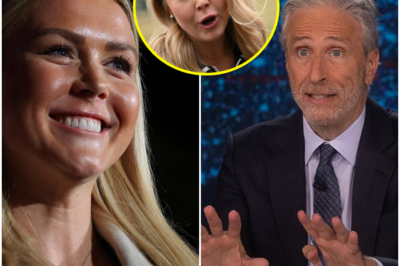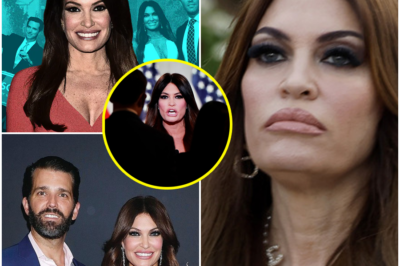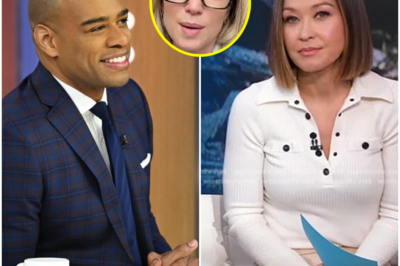Karoline Leavitt BANS CNN’s Kaitlan Collins from Press Brief After STUPID Question! What Happened During the Heated Exchange That Led to This Shocking Move? Fans Are Stunned by Leavitt’s Bold Decision to Exclude Collins. What Was the Question That Crossed the Line, and How Did Leavitt Respond? Get the Full Scoop on the Tense Moment That Has Everyone Talking About This Explosive Press Brief!

Karoline Leavitt BANS CNN’s Kaitlan Collins from Press Brief After STUPID Question
In an unprecedented move that has left both the media world and political circles in shock, Karoline Leavitt, the White House Press Secretary, banned CNN’s Kaitlan Collins from a recent press briefing after what Leavitt described as a “stupid question.” The decision, which many are calling bold and controversial, sparked a wave of reactions from journalists, politicians, and fans alike. What exactly happened during the exchange, and why did Leavitt decide to take such a drastic step?
The incident occurred during a high-stakes press briefing, where Leavitt was addressing a critical issue regarding national security. The briefing had already garnered attention due to its importance, and various media outlets, including CNN, were on edge to ask their questions. However, when Collins, known for her tough questions and political commentary, raised her hand to ask a question, the situation quickly turned heated.
Collins, who has been a prominent White House correspondent for CNN, asked a question that many believed was out of place for the briefing’s focus. “Given the recent political climate, how does the White House plan to address the growing divide between parties and the public’s increasing distrust in the administration?” Collins asked, an inquiry that seemed disconnected from the briefing’s central topic.
Leavitt, known for her assertiveness and no-nonsense approach to her role, quickly snapped back with a sharp response. “I’m sorry, Kaitlan, but that’s a stupid question,” Leavitt said, her voice calm but firm. “If you have something relevant to this briefing, we’ll gladly take your question, but I don’t think we’ll be entertaining off-topic concerns today.”
The room fell silent, with other reporters exchanging looks of disbelief. Collins, visibly taken aback, attempted to respond, but Leavitt cut her off. “Please leave the room if you have nothing to contribute to this discussion,” Leavitt added, before swiftly turning back to the other journalists.
The decision to ban Collins from the briefing has sent shockwaves through the media community. Many have praised Leavitt for standing firm in the face of what she saw as an irrelevant and distracting question. “Karoline is doing what she needs to do to keep the focus on the important issues at hand,” one fan wrote on social media. “Sometimes the press tries to steer the conversation in the wrong direction, and she’s just keeping it real.”
However, others have criticized Leavitt’s actions as a dangerous move against the free press. “This is a direct attack on the press, and it sets a dangerous precedent,” one critic commented. “The role of a press secretary is to answer questions, even if they’re uncomfortable or challenging. Banning a journalist for asking a valid question is simply unacceptable.”
The backlash has been particularly fierce among journalists, with some questioning Leavitt’s ability to handle the tough, probing questions that often come with the job. “Kaitlan Collins is one of the most respected correspondents in the industry, and to be dismissed so callously is a slap in the face to press freedom,” said a colleague of Collins.
As the story unfolded, many were left wondering how this will affect Leavitt’s standing within the press community. While some see her as a strong, decisive leader, others worry that her actions may further alienate the press corps. “The role of a press secretary is to foster communication, not shut down dialogue,” one observer remarked.
In the aftermath of the incident, Leavitt’s office has remained tight-lipped, offering no official explanation for her decision. However, sources within the White House suggest that the tension between Leavitt and certain members of the media has been growing in recent months, with Leavitt becoming increasingly frustrated with what she perceives as biased and misleading reporting.
For now, the incident has only fueled the ongoing debate about the relationship between the media and the government. What started as a heated exchange in a press briefing has now become a flashpoint for discussions on press freedom, political accountability, and the role of journalists in shaping public discourse.
As the dust settles on this dramatic moment, fans and critics alike will continue to watch Karoline Leavitt’s handling of the press and whether she will continue to take such bold, controversial steps in the future. One thing is certain: this press briefing has forever changed the relationship between the White House press secretary and the media.
News
BREAKING: Basketball Legend Michael Jordan Criticizes Angel Reese, Claiming She Lacks Real Skills and Focuses on Flaunting Sexy Photos Online Instead of Improving Her Game! Fans Are Stunned by Jordan’s Public Remarks—What Sparked This Controversial Critique, and How Is Angel Reese Responding? Get the Full Scoop on the Shocking Statement from the Basketball Icon and What This Means for Angel Reese’s Career Moving Forward!
BREAKING: Basketball Legend Michael Jordan Criticizes Angel Reese, Claiming She Lacks Real Skills and Focuses on Flaunting Sexy Photos…
SHOCKING: Jon Stewart Mocked Karoline Leavitt but Immediately Faced Her Ruthless Comeback—A Statement That Exploded All Over American Social Media! What Sparked This Fiery Exchange Between the Two? Fans Are Left Stunned by Leavitt’s Powerful Response to Stewart’s Criticism. Get the Full Scoop on the Explosive Moment That Has Everyone Talking About Karoline Leavitt’s Bold and Unapologetic Reaction!
SHOCKING: Jon Stewart Mocked Karoline Leavitt but Immediately Faced Her Ruthless Comeback—A Statement That Exploded All Over American Social…
CBS Unleashes a $700 Million Bombshell—Megyn Kelly and Candace Owens Set to Rival The View with Explosive New Morning Show! Sources Claim It’s the Boldest Daytime TV Move Yet, Already Stirring Wild Reactions from Liberals. What’s Really Behind This Jaw-Dropping $700 Million Deal, and How Will It Change the Landscape of Morning Television? Get the Full Scoop on CBS’ Game-Changing Move!
CBS Unleashes a $700 Million Bombshell—Megyn Kelly and Candace Owens Set to Rival The View with Explosive New Morning…
People Suddenly Understand the Real Reason Kimberly Guilfoyle’s Fiancé Dumped Her After Unfiltered Photo Exposes Shocking Details! Fans Are Stunned by the Unseen Side of Guilfoyle’s Relationship. What Was Revealed in the Photo, and Why Did It Lead to the Breakup? Get the Full Story Behind the Unfiltered Image That Changed Everything About Kimberly Guilfoyle’s Personal Life and Her Relationship with Her Fiancé.
People Suddenly Understand the Real Reason Kimberly Guilfoyle’s Fiancé Dumped Her After Unfiltered Photo Exposes Shocking Details! Fans Are…
Elon Musk Announces DOGE Will Save the U.S. Government Over $150 Billion by Cutting Waste and Fraud in Fiscal 2026! Fans Are Stunned by His Bold Prediction. How Will DOGE Achieve This? Get the Full Inside Scoop on Musk’s Plan!
Elon Musk Announces DOGE Will Save the U.S. Government Over $150 Billion by Cutting Waste and Fraud in Fiscal…
BREAKING: GMA3 Faces Major Shakeup—ABC Boss Plans to Ax DeMarco Morgan and Eva Pilgrim by Summer! What’s Behind the Shocking Rumors, and Why Are the Popular Hosts Being Let Go? Fans Are Left Stunned by the Potential Changes to Good Morning America’s Lineup. Get the Full Story on What’s Behind the Shakeup, What This Means for GMA, and Who Might Be Replacing Them!
BREAKING: GMA3 Faces Major Shakeup—ABC Boss Plans to Ax DeMarco Morgan and Eva Pilgrim by Summer! What’s Behind the…
End of content
No more pages to load












